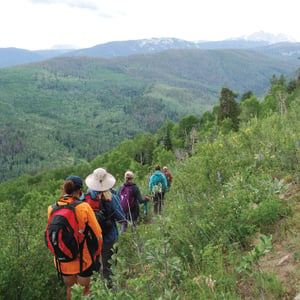
When you hear “Leave No Trace,” what do you think about? Are you reminded of fellow hikers picking up litter along the trail to Missouri Lakes? Do you think about leaving only footprints and taking only photographs? Or are you reminded of backpacking techniques from your childhood like the 7 D’s of backcountry defecation (desire, distance, dig, deliver, disguise, disinfect, discuss- contact the author for more information!).
Whatever it is you think of, chances are you are reflecting on the values you ascribe to our natural environments, wilderness, and the opportunities for recreation in natural settings. This connection to our values occurs because The Leave No Trace Center for Outdoor Ethics promotes its 7 Principles, not rules, aimed at reducing the damage caused by outdoor activities.
Principles, simply defined, are truths or propositions that serve as a foundation for beliefs, actions, or reasoning. Thus, the 7 principles are pieces of information that can be used as a foundation for curating our behaviors in outdoor environments. For example; Principle #7 reads “Be Considerate of Other Visitors.” Some suggestions they provide are to, “let nature’s sounds prevail” and “take breaks and camp away from trails.” There is, however, room for interpretation and subjectivity because what seems like a certain level of consideration to me might be over the top for different trail users and vice versa. Regardless, subscribing to a principle of consideration towards our fellow trail users seems a worthy jumping off point to dive into the trickier principles.
As we inch towards hiking, biking, and the lovely summer season here in the mountains, we will undoubtedly hear the common refrain of “loving it to death” or even those more dramatic and off-kilter comments suggesting we somehow keep environments off-limits to those who don’t live locally. Principle #1 can help us out navigate some of these issues. “Plan Ahead and Prepare,” is the first and arguably most important Leave No Trace Principle. If you’ve planned ahead, you’ve already considered the crowds on Booth Falls Trail or Hanging Lake, and you’ve probably chosen another location for your hike. If you’ve prepared thoughtfully, maybe you even included an extra bottle of water and a map to share with the trail user who isn’t quite as prepared (tying back into Principle #7!). Planning and preparation takes time, but there are great resources in the valley to help. See Walking Mountains’ hiking programs or the new Mountain Recreation Explorer Camps.
Another principle we cannot overlook in the Eagle Valley is Principle #6, “Respect Wildlife.” We are learning more and more from our local land managers and wildlife professionals and the conversations around town seem to be renewed with a sense of stewardship and responsibility towards our local herds. Respect can take on many different manifestations, and it is up to us to define and act on the level of respect that mirrors the values we hold towards our local wildlife populations. See the local seasonal trail closures, the VVMTA’s Adopt-a-trail program, or the Town of Vail’s Wildlife Forum.
The 7 Leave No Trace Principles are great reminders for how we could, should, and can act to promote a standard level of experience in the great outdoors that we can all agree on. The 7 Principles, and potential upcoming 8th and 9th in regards to pets and social media respectively, are worth keeping in mind when meeting new trail buddies and preparing for the upcoming seasons.
Again, do more than just take photographs. Make memories from the sounds, scents, and sights of our beautiful environments, and try not to leave footprints (Principle #2- travel on durable surfaces!). Instead, leave with a renewed sense of stewardship and ownership that can - and does - have an immediate and lasting effect on the natural environments we so luckily call our home.
Peter Suneson is certified by the Leave No Trace Center for Outdoor Ethics as a Master Educator and is the Outreach and Education Specialist for Eagle County Open Space. He loves talking through ethical dilemmas and value-laden discussions especially when it comes to the great outdoors. You can connect with him directly at 970-328-8637









